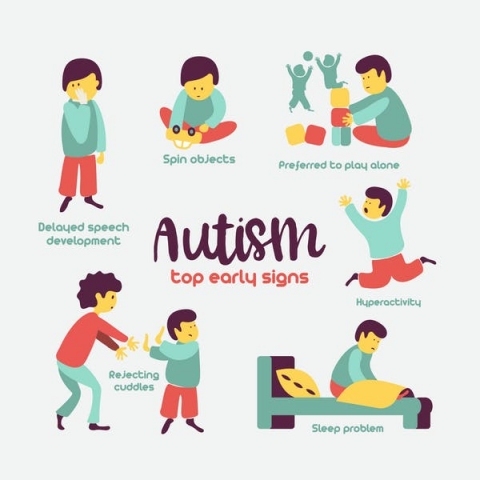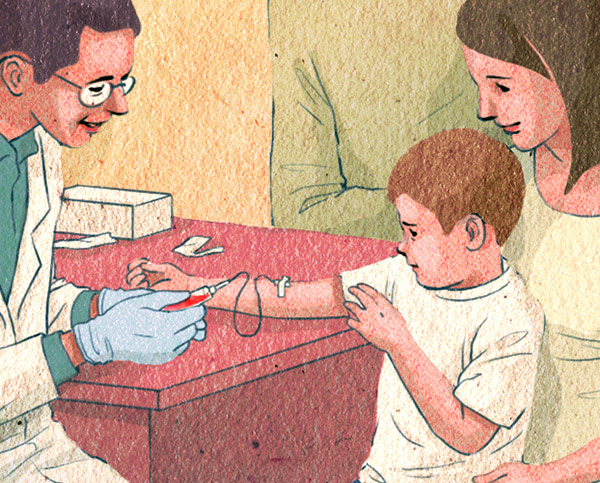If you’re worried that your child may have autism, you’re not alone. Autism spectrum disorder (ASD) is becoming more and more common, with 1 in 68 children diagnosed. It can be difficult to tell whether or not your child has autism, but there are some signs and symptoms that may indicate that he or she does. In this article, we will discuss the signs and symptoms of autism, as well as how to get help if you think your child may have ASD.
Contents
- 1 What Is Autism?
- 1.1 Symptoms Of Autism In A Child
- 1.2 Causes Of Autism In A Child
- 1.3 Negative Impact Of Autism
- 1.4 Diagnosis Of Autism In Children
- 1.5 When To Seek Professional Help
- 1.6 Therapy Options For Autism
- 1.7 Medication Options For Autism In Child
- 1.8 Parenting Tips For Autism
- 1.9 Helping Your Child Deal With Autism
- 2 Conclusion
- 3 A Word From Therapy Mantra
What Is Autism?

Autism spectrum disorder (ASD) is a neurological and developmental disorder that begins early in life, often before three years of age. It affects how a person perceives the world and interacts with others.
People with ASD may have difficulty understanding what they see and hear. They may also find it hard to communicate with others and interact socially. Many people with ASD prefer not to be touched or hugged.
Symptoms Of Autism In A Child

Some common signs of autism include:
- Not responding when called by name: A child with autism may not turn to look at you when their name is called.
- Not pointing at objects: A child with autism may not point at things to show you what they want.
- Having difficulty making eye contact: A child with autism may not look at you when you talk to them.
- Reacting differently to sounds: A child with autism may be overly sensitive to some sounds or ignore others.
- Preferring to be alone: A child with autism may not want to play with other children and may prefer to play alone.
- Having a restricted range of interests: A child with autism may be interested in only a few things and not want to try new things.
- Not waving goodbye: A child with autism may not wave goodbye or respond to other gestures.
- Having delayed speech and language development: A child with autism may not start talking until much later than other children.
- Being extremely sensitive to noise or bright lights: A child with autism may be very sensitive to noise or bright lights and find them difficult to tolerate.
- Speaking in a flat, monotone voice: A child with autism may not use different tones of voice when speaking.
- Having unusual body movements: A child with autism may flap their hands, rock back and forth, or spin around.
- Repeating words or phrases: A child with autism may repeat words or phrases that they hear.
In some cases, a child with autism may not show any signs of the disorder. Autism is a spectrum disorder. This means that each child might experience different symptoms.
Causes Of Autism In A Child
There is still much unknown about the cause of autism. However, research suggests that a combination of genetic and environmental factors may contribute to autism. Some of the possible causes of autism include:
- Genetic factors: Autism is known to run in families. Studies have shown that genes may play a role in some cases of autism.
- Environmental factors: Exposure to certain toxins, such as mercury, during pregnancy or early childhood may increase the risk for autism. Also, lack of exposure to important vitamins and minerals may also be a factor. For example, research suggests that children who do not get enough vitamin D are more likely to develop autism.
Negative Impact Of Autism
Autism can have a negative impact on the individual’s life as well as the lives of their loved ones. Autistics may struggle with communication, socializing, and emotional regulation. This can lead to isolation, depression, and anxiety. In some cases, autistics may also be aggressive or engage in self-injurious behavior. The families of autistics often bear the brunt of these challenges, leading to stress and marital problems. It is important to get help if you are struggling due to your child’s autism. There are many resources available to both parents and autistics alike. Don’t hesitate to reach out for help if you need it. You are not alone.
The good news is that there is hope for those affected by autism. With early diagnosis and intervention, many people with autism can overcome the challenges associated with their condition and lead happy, productive lives. There are also many support groups available to help families cope with autism. So don’t give up hope if your child has been diagnosed with autism. There is plenty of help available to you.
Diagnosis Of Autism In Children
There are many different ways to diagnose Autism Spectrum Disorder in children. The most common way is through a series of evaluations by a team of specialists. This team may include a developmental pediatrician, neurologist, psychologist, and speech therapist. They will look at the child’s development history, behavior, communication skills, and social interactions. There is no one specific test that can diagnose autism, but there are certain behaviors that are often associated with it.
When To Seek Professional Help
If you are concerned that your child may have autism, it is important to seek professional help as soon as possible. Early diagnosis and intervention can make a big difference in the life of a child with autism. The sooner you get help, the more options you will have for treatment.
Therapy Options For Autism

There are many different types of therapy available for children with autism. Some common therapies include:
- Behavioral therapy: This type of therapy focuses on changing the behavior of a child with autism.
- Applied behavioral analysis (ABA): ABA is one of the most common and effective therapies for autism. It involves breaking down tasks into small steps and teaching children how to complete them.
- Speech therapy: This therapy helps children who have trouble speaking or pronouncing words.
- Occupational therapy: This therapy helps children learn everyday skills, such as dressing themselves, brushing their teeth, and using the toilet.
- Social skills training: This type of therapy teaches children how to interact with others effectively.
Furthermore, if you are not sure which type of therapy is right for your child, talk to your doctor or therapist. They will be able to help you find the best treatment option for your child.
Choosing The Right Therapy For Your Child
It can be difficult to choose the right therapy for your child with autism. There are many different options available, and each child responds differently to different therapies. It is important to find a therapy that your child is willing to participate in and that you can afford.
If you are not sure which therapy is right for your child, talk to your doctor or therapist. They will be able to help you find the best treatment option for your child.
There is no one specific test for autism spectrum disorder in children, but there are certain behaviors that are often associated with it. The sooner you start treatment, the more options are available to treat someone with autism. Also, your family will have better-coping skills.
There exist an abundance of various therapies designed uniquely to treat ASD’s symptoms such as behavioral therapy
Medication Options For Autism In Child
There are no medications that can cure autism, but there are some that can help manage the symptoms. Some of the most common medications used to treat autism are:
- Stimulants: Stimulants are often prescribed to children with ADHD and autism. They help improve focus and attention span.
- Antipsychotics: Antipsychotics are used to control aggressive or destructive behavior.
- Selective serotonin reuptake inhibitors (SSRIs): SSRIs are antidepressant medications that have been shown to be effective in treating some symptoms of autism.
Hence, if you think your child may benefit from medication, talk to your doctor about what options are available. Medication should always be taken under the supervision of a doctor.
Parenting Tips For Autism
So you’ve just been told by your doctor that your child may have autism. What do you do now? The first thing you need to do is take a deep breath and relax. Autism is a spectrum disorder, which means that there is a wide range of symptoms that one can exhibit. Your child may only exhibit a few signs, or they may display most of the common symptoms.
There are many ways to get help for children with autism.
- Start by talking to your pediatrician about what resources are available in your area. They will likely be able to refer you to an early intervention program or other services provided through the school system.
- You can also find information and support from online groups specifically for parents of autistic children. There are also books and websites that can offer advice and support.
- The most important thing is to remember that you are not alone. There are many families who are dealing with the same challenges as you are. Also, you can seek out help and support, and don’t be afraid to ask for help when you need it.
Helping Your Child Deal With Autism

Here are a few tips to help your child deal with autism:
- Encourage your child to be themselves. Don’t try to change them into someone they’re not.
- Help them learn how to cope with their feelings. Teach them how to express their emotions in healthy ways.
- Make sure they get plenty of exercises and fresh air. Exercise is good for the body and the mind.
- Give them plenty of positive reinforcement. Let them know that you love and support them, no matter what.
- Teach them life skills such as cooking, cleaning, and money management. These skills will help them become more independent adults.
- Get their involvement in social activities. Help them find programs and activities that they enjoy and that will help them make friends.
- Make sure they get a good night’s sleep. A well-rested child is a happy child.
Conclusion
Autism is a developmental disorder that affects how a person communicates and interacts with others. 1 out of every 68 children in the U.S. has autism spectrum disorders, which is more common than childhood cancer. Autism is a condition that affects how people communicate and interact with others, as well as how they process information. Some people with autism may be very sensitive to noise or touch and may have repetitive behaviors or interests. There are many different ways to treat autism. Different plans depend on the person with autism. Finally, some common interventions for autism include speech therapy, occupational therapy, behavioral therapy, and medications.
A Word From Therapy Mantra
Your mental health — Your psychological, emotional, and social well-being — has an impact on every aspect of your life. Positive mental health essentially allows you to effectively deal with life’s everyday challenges.
At TherapyMantra, we have a team of therapists who provide affordable online therapy to assist you with issues such as depression, anxiety, stress, workplace Issues, addiction, relationship, OCD, LGBTQ, and PTSD. You can book a free therapy or download our free Android or iOS app.


